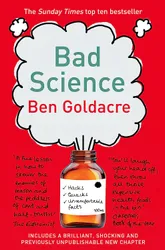Certainty in the field of medical science is very difficult compared to other sciences like chemistry or physics, where the conditions for experiments can be tightly controlled. The human body presents several difficulties when it comes to expanding our knowledge through the scientific method. It’s an extremely complex system which is hard to understand, and everyone’s body is a little bit different, responding differently to physical and mental stimuli, including drugs. There are many confounding factors in our upbringing, wealth, lifestyle and environment which can affect our overall health and the apparent effectiveness of medical treatments or preventative measures. There also appears to be an important link between the brain and the body, in which our beliefs and expectations influence how we respond to medical interventions (the placebo effect). All these things make it difficult to conduct reproducible experiments well, even if the experimenters are trying really hard to be as objective as possible, and it leaves a lot of room for uncertainty. Unfortunately there are many unscrupulous people and organisations who are prepared to exploit that uncertainty for their own benefit.
This book focuses on the ways that the scientific method is manipulated and misrepresented in order to confuse the public and enrich those doing the manipulation. Goldacre uses the example of Homeopathy (and alternative medicine in general), to cover what makes a medical trial a good one, what the common flaws are, and how the results can be misrepresented.
Next in the firing line are nutritionists, and I was interested to learn that there is no certification that anyone is required to have in order to call themselves a nutritionist. You can just declare yourself to be one. Nevertheless, we meet a motley crew of nutritionists who claim various other qualifications, usually PhDs from various dodgy correspondence schools, so they can call themselves “doctor” in order to raise their own status. The game for all of these people seems to be pretty similar. They claim authority through spurious qualifications, misrepresent studies and trials in various ways to set their agenda and cast doubt on the abilities of modern medicine to solve some problem, and then sell their own brand of pill (or device) for profit. In the process, they make use of the media to publish positive articles about them. The subject matter ranges from seemingly moderately harmless interventions like omega-3 fish oil supplements, backed up by poorly conducted trials on schoolchildren, all the way to shocking and reprehensible things like claiming that AIDS in South Africa is a hoax, that anti-viral mediations don’t work, and selling vitamin pills instead, resulting in much unnecessary death and suffering.
After nutritionists, the book covers the role of pharmaceutical companies, the media and others in misrepresenting science, covering topics like the MMR vaccine scare, and how pharmaceutical companies can cherry pick their data to make their new drugs look good.
The book is written from a UK perspective, so many of the examples won’t be so familiar to readers from other countries. Different, but similar, food and medicine scares seem to have taken place in other countries, and the reasons and methods behind these events are the same wherever you are. It is also still absolutely relevant today, despite being first published in 2008 (my copy was from 2009), because although some of the stories mentioned may have faded from memory, the mistakes of journalists and the tricks and methods of nutritionists, dodgy pharmaceutical companies and others, haven’t changed. The book might reduce your confidence in what you read in the news, especially when that news concerns health issues or medical science. While certain news outlets get mentioned a lot for publishing dubious or outright wrong material, even the more reputable news organisations publish rubbish sometimes or repeat the mistakes of others. This book will arm you with the knowledge to spot bad science in the media, to notice what information is missing, and what you should be asking questions about when you encounter an intriguing science story.
The writing throughout this book is very witty and it made me laugh in several places. I enjoyed the vitriol aimed at nutritionists in particular! The humour helps to lighten what might otherwise be a depressing book. It might shake your faith in human nature a bit to realise that there are so many people who are out to confuse and mislead people for their own gain. But despite this I really like this book and loved reading it. I’ve known about it for a while, and I can’t believe it took me so long to get around to reading it.
For those of us who view science as a positive in our world, and a way towards an even better world, learning about the ways it’s abused and exploited by people motivated only by their own personal gain can be really disheartening. I’m really glad books like this exist to poke fun at these people, and to help the rest of us spot their dishonesty.
